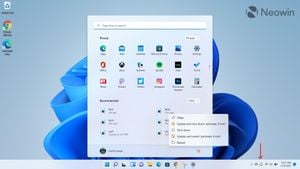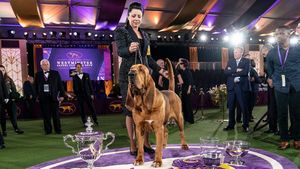T-Mobile made waves during Super Bowl LIX, opting for technology over star power with its latest commercial featuring its partnership with Elon Musk's Starlink. The ad, aired during the first quarter of the game, departed from T-Mobile’s tradition of showcasing A-list celebrities, focusing instead on the groundbreaking capabilities of satellite communication.
Viewers saw the ad spotlighting the launch of T-Mobile's new satellite-to-cell service, aiming to tackle the persistent connectivity issues faced by users across much of the United States. According to T-Mobile, there are over 500,000 square miles where traditional cell towers cannot reach, leaving countless areas, known as 'dead zones,' unable to send emergency texts or share cherished moments. This commercial marked the rollout of the service, encouraging customers, including those from rival carriers Verizon and AT&T, to take advantage of free access through July.
Mike Katz, T-Mobile's president of marketing, strategy, and products, stated, "Anybody that's ever had a cell phone has experienced this problem, and this solution solves it." He emphasized the revolutionary nature of the service, which allows users to send text messages without relying on traditional cell reception. This shift highlights T-Mobile's goal of placing the technology as the star of the campaign rather than celebrity endorsements.
The decision to focus on T-Mobile's satellite technology is significant. With the mobile satellite services market projected to reach $7.46 billion by 2030, competition is heating up among major players like Verizon and AT&T, both of whom are also pursuing similar capabilities. Katz noted T-Mobile's unique position, claiming, "The only service from an American wireless company is the one T-Mobile is announcing on the Super Bowl." This bold statement reflects the intense competition within the telecommunications sector.
Interestingly, this year’s Super Bowl commercials didn't shy away from addressing pressing contemporary themes, such as artificial intelligence and digital connectivity. T-Mobile’s focus on technology resonates with broader trends observed during the game, where many brands attempted to capture audience attention with innovative themes. The ad also serves as part of T-Mobile’s larger strategic shift, potentially indicating a new direction for future advertising efforts.
The last two years had seen T-Mobile garner attention with high-profile celebrity appearances, incorporating well-known figures like Bradley Cooper and singer Snoop Dogg. This year's approach marks a departure, as T-Mobile's Katz noted the decision was made to highlight the service itself rather than relying solely on familiar faces.
Elsewhere during the Super Bowl, other brands competed for attention with diverse advertising strategies. For example, Nike made its return to Super Bowl advertising after 27 years, promoting female empowerment through sports, highlighting athletes like Caitlin Clark and Sha'Carri Richardson. This juxtaposition between T-Mobile's tech-centric approach and Nike's female-driven message showcases the variety of perspectives brands aimed to share with viewers this year.
While many ads leaned on humor or nostalgia, such as Little Caesars' comical take starring Eugene Levy, T-Mobile opted for serious engagement, positioning itself as the industry innovator. The stakes were high; each 30-second ad slot reportedly cost around $8 million, necessitating creativity and impact to justify such expenditure.
Reflecting on the high costs of advertising during such events, Mark Evans from Fox Sports acknowledged the risks, stating, "61% of respondents questioned the value of these expensive ads." Yet, T-Mobile's bold messaging may have struck the right chord, emphasizing their commitment to connecting users grounded even where traditional technology fails.
Elon Musk's presence loomed large throughout the evening, not only with T-Mobile's advertisement but also through Starlink's reputation for providing innovative communications solutions. Starlink’s ability to deliver broadband service globally connects back to their goal of supporting people in remote and rural areas who often feel isolated from the digital world.
Some analysts have pointed out the significance of T-Mobile's partnership with Starlink as indicative of shifting paradigms within telecommunications. By moving to satellite-based solutions, T-Mobile challenges competitors to keep pace, creating excitement among consumers eager for reliable communication options regardless of location.
Looking at the lasting impact of Super Bowl LIX commercials, T-Mobile’s strategy of focusing on technological innovation rather than celebrity presence suggests they are preparing for burgeoning competition and potential market disruptions. Katz indicated this marketing shift could pay dividends if the new satellite services resonate with users. Such tactical maneuvers will likely shape the telecommunications industry, opening pathways for competitors to innovate and react.
While the Philadelphia Eagles emerged victorious on the field, it remains to be seen which company will triumph when the dust settles after this year’s Super Bowl. T-Mobile's bold venture may set the stage for future developments, whether it leads to enhanced service options for consumers or inspires its rivals to step up their game.



